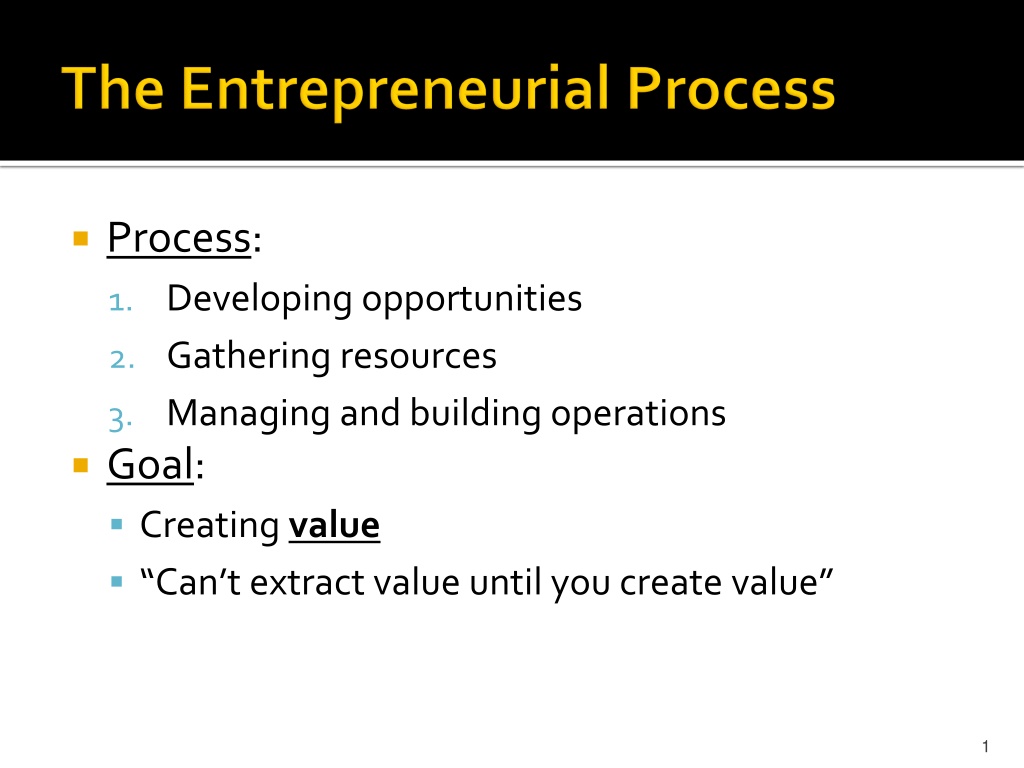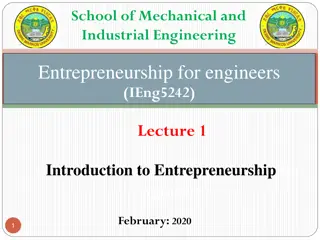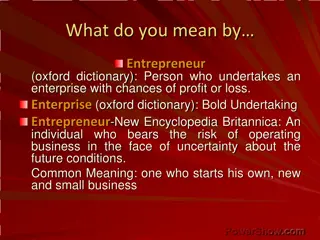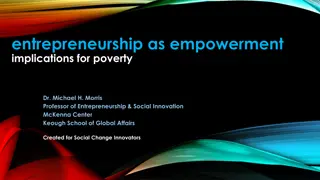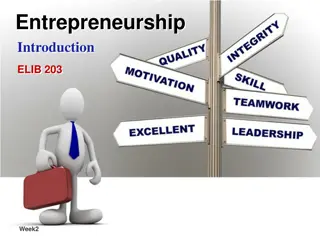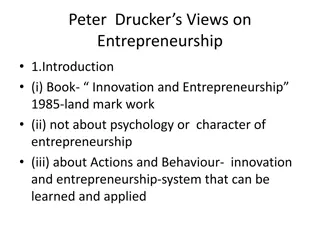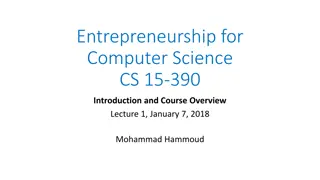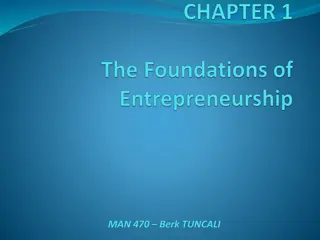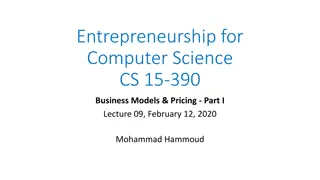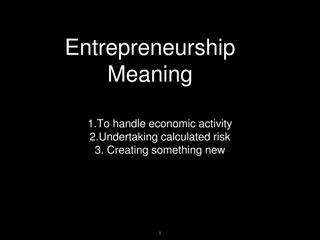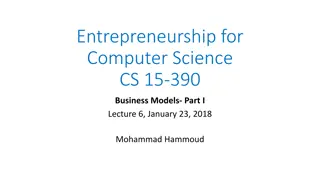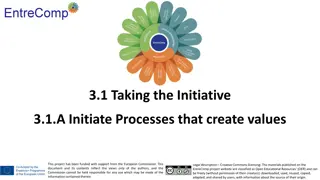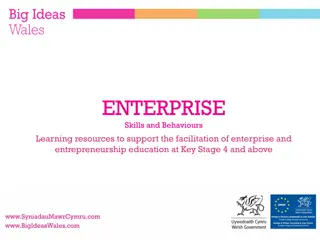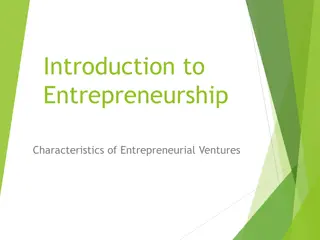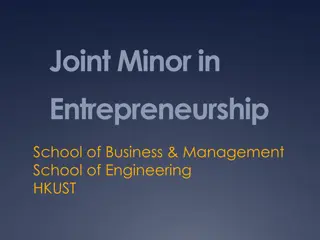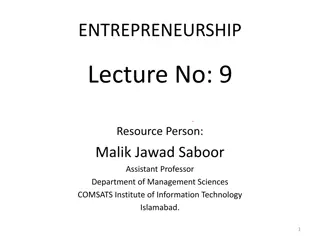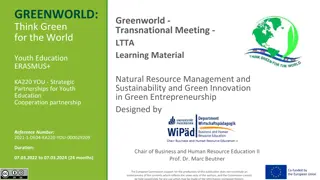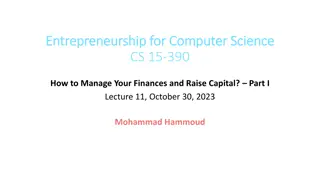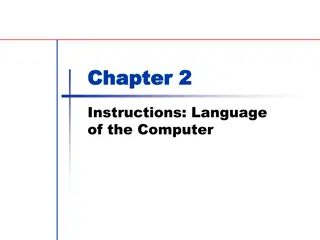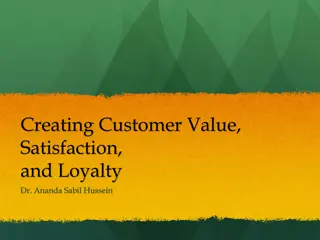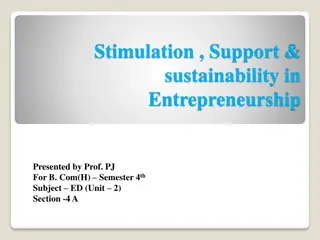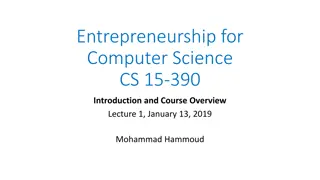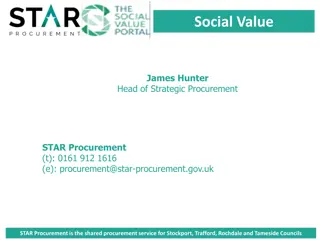Entrepreneurship and Creating Value in Business Operations
Developing opportunities, gathering resources, and managing operations are vital steps in creating value in entrepreneurship. Successful entrepreneurs identify commercial opportunities, stay optimistic, and secure the resources needed for their ventures. Despite risks such as firm terminations and limited success rates, exceptional execution plays a significant role in achieving business success. Understanding demographic trends, such as the influence of aging baby boomers, can also provide valuable business opportunities.
Download Presentation

Please find below an Image/Link to download the presentation.
The content on the website is provided AS IS for your information and personal use only. It may not be sold, licensed, or shared on other websites without obtaining consent from the author. Download presentation by click this link. If you encounter any issues during the download, it is possible that the publisher has removed the file from their server.
E N D
Presentation Transcript
Process: 1. Developing opportunities 2. Gathering resources 3. Managing and building operations Goal: Creating value Can t extract value until you create value 1
Entrepreneurship: process of changing ideas into commercial opportunities and creating value Entrepreneur: individual who thinks, reasons, and acts to convert ideas into commercial opportunities and to create value 2
A successful entrepreneur: Sees and seizes a commercial opportunity Tends to be doggedly optimistic (perhaps even to a fault) Plans to obtain the physical, financial, and human resources needed for the venture to succeed 3
Risks: Annual employer firm births (~659,093 in 2005-07) slightly exceeds terminations (~578,793 in 2005-07) Note, however, that bankruptcies are only a fraction (~29,073) of terminations - terminations not all bad For new firms, a representative study (Headd) found (a) one-third of new employer firms endure < 2 years (b) one-half endure < 4 years (c) 60 percent endure < 6 years (d) but, about one-third were successful at closing 4
Research (J. Case) suggests 12% of Inc. 500 success is due to extraordinary idea 88% due to exceptional execution of ordinary idea 5
Harry Dents Generations The Baby Boom 1. Spending wave (1990 s) - Behind the stock and bond market booms 2. Power wave (to peak in the 2020 s) - Aging baby boomers with great business influence - Aging baby boomers provide business opportunities creating them, financing them, using them 6
Real, Human, and Financial Capital Must be Rented from Owners Money has owners and therefore costs Time value Risk Expect to provide a return or the venture will not survive in a market economy 8
Risk and Expected Reward Go Hand in Hand Time value is not the only cost when using others funds More risk => More expected reward How much more? Market-determined! 9
While Accounting is the Language ofBusiness, Cash is the Currency Two important reasons to employ accounting: 1. Tracking and accountability for actions taken 2. Quantifying different visions of the future But, remember cash flow is a new venture s lifeblood Get enough accounting to see through the accruals to the cash account Cash burn: gap between cash being spent and that being collected Cash build: excess of cash receipts over cash distributions 10
New Venture Financing Involves Search, Negotiation, and Privacy Public Financial Markets: standard contracts traded on organized exchanges Private Financial Markets: customized contracts bought and infrequently sold in inefficient private negotiations 11
A Ventures Financial Objective is to Increase Value Many objectives, including personal ones But, the unifying financial objective is to increase value rather than price, margin or sales rather than profit, return or net worth (Market) Value derives from the ability to generate cash to pay capital providers for their capital 12
It is Dangerous to Assume that People Act Against Their Own Self-Interest Aligning incentives (investors, founders, employees, spouses, etc.) is critical As situations change, incentives diverge and renegotiation is important Owner-manager conflicts: differences between a manager s self-interest and that of the owners who hired him/her Owner-debtholder agency conflict: divergence of the owners and lenders self-interests 13
Venture Character and Reputation Can be Assets or Liabilities Ventures have character that can be different from the individuals who founded or manage it Many entrepreneurs state that high ethical standards are one of a venture s most important assets and are critical to long-term success and value Ventures can - and do - make meaningful societal contributions Many successful entrepreneurs are financially and personally involved in charitable endeavors 14
Entrepreneurial Finance application and adaptation of financial tools and techniques to the planning, funding, operation, and valuation of an entrepreneurial venture 15
Development Stage Developing opportunities and seed financing Startup Stage Gathering resources and startup financing Survival Stage Gathering resources, managing and building operations and first-round financing Rapid-Growth Stage Managing and building operations and second-round mezzanine, & liquidity stage financing Early Maturity Stage Managing and building operations and obtaining bank loans, issuing bonds, & issuing stock 17
Seed Financing: funds needed to determine whether the idea can be converted into a viable business opportunity Startup Financing: funds needed to take the venture from having established a viable business opportunity to initial production and sales 18
Venture Capital: early-stage financial capital often involving substantial risk of total loss Venture Capitalists: individuals who join in formal, organized firms to raise and distribute venture capital to new and fast-growing ventures Business Angels: wealthy individuals operating as informal or private investors who provide venture financing for small businesses Investment Banker: individual working for an investment bank who advises and assists corporations in their security financing decisions and regarding mergers and acquisitions 19
